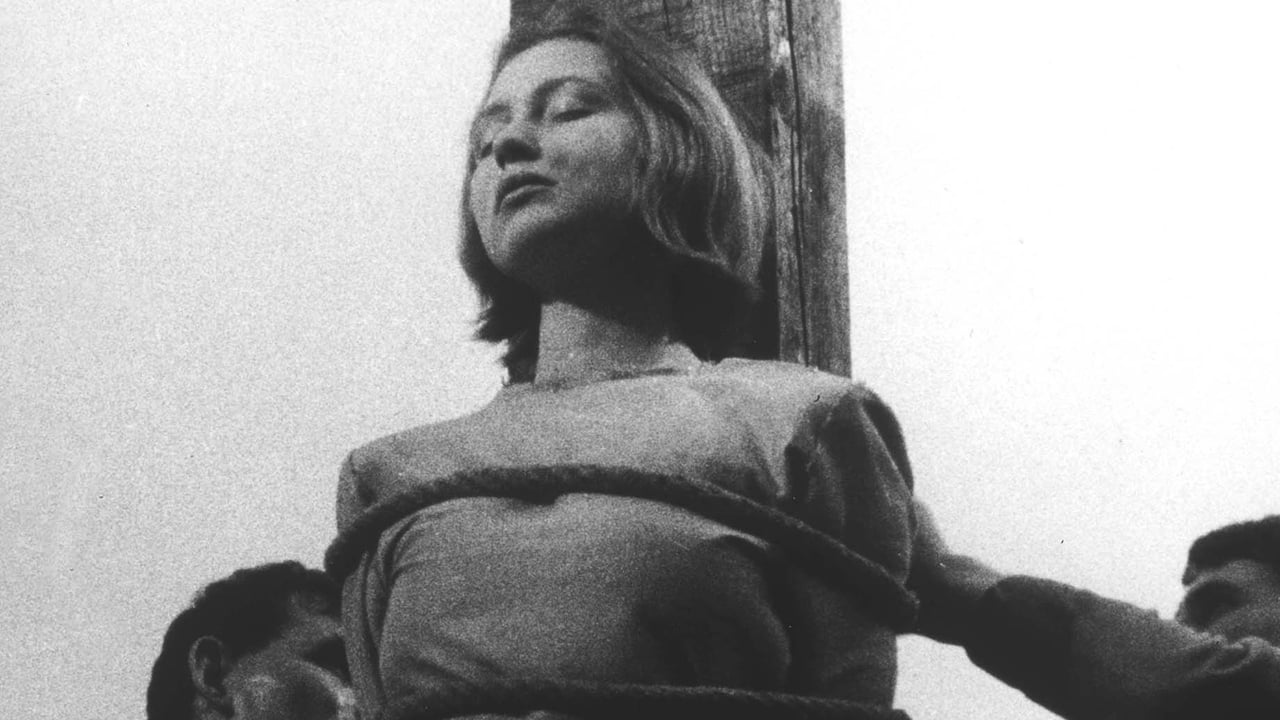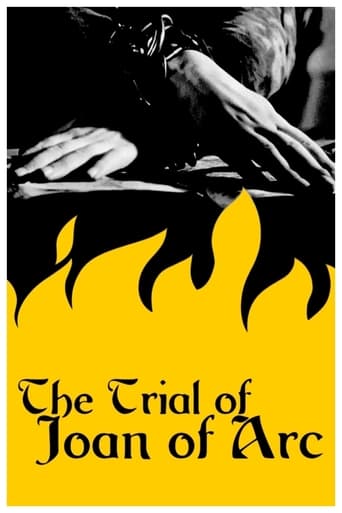

In the brilliant "Passion of Joan of Arc" (1928), Maria Falconetti probably performed the greatest acting feat on the silent silver screen. Her facial emotion and suffering during an incredibly intense historical trial remain legendary. Those close-up shots remain stunning, while the overall circus atmosphere was absolutely electrifying! The one drawback in the Passion though is Ms. Falconetti's age, which was twice that of Joan during the latter's ordeal in 1431.In "The Trial of Joan of Arc" (1962), Florence Delay plays Jeanne D'Arc realistically. Her film age was only a few years older than the real Joan. Ms. Delay was quite attractive, and it is easy to focus on her. But beyond her looks, her performance, while not in the league of Ms. Falconetti, is still commendable. Ms. Delay does demonstrate courage, serenity, and integrity in a dry, unemotional manner. Note that Joan did not even have a legal representative at the trial. And, instead of a church prison, Joan was rather unsafely incarcerated in a secular jail guarded by the English. Brave teen-aged Joan never betrayed herself or her faith, and she received Holy Communion before her martyrdom at Rouen. Most of our attention is centered on the tense trial itself, of which the court transcript still survives. Director Bresson's focus was more on "The Maid of Orleans" and less on the jurors. Nevertheless the characters are developed. The modest film runs only slightly more than an hour in length.It is very important to note that the film does explain why Joan was sentenced in the end. The court was totally in the control of Anglophiles – many from the University of Paris – or those Frenchmen who supported England in the attempt to conquer France in the Hundred Years' War (1337-1453). Note that it is the English authorities who are in real charge. And since it was Jeanne D'Arc who solely changed the tide of war at Orleans (1429), she was the leading target. When events became clear after the long war, the pope reopened the trial (1455). The result was that Joan was posthumously exonerated of any heresy (1456). Eventually Joan was elevated to sainthood (1920).
... View More. . . just happened? Why does writer\director Robert Bresson assume that he can dispense with a back story and an ending here? If a person hasn't aced Western Civilization recently or grown up in New Orleans (which has a statue of Joan somewhere), they probably won't know Joan of Arc from Joan Van Ark. This film--THE TRIAL OF JOAN OF ARC--is based upon another French flick, the 1928 silent THE PASSION OF JOAN OF ARC, but as a "talkie," it manages to tell a lot LESS of Joan's story than its predecessor. As "Joan" in THE TRIAL OF JOAN OF ARC, Florence Delay seems much more happy-go-lucky than Melle Falconetti, who, as Joan, appears crazed and scared out of her skull in the earlier treatment, directed by Carl Dreyer. When it comes to saints, who can argue that crazy isn't better?
... View MoreJoan of Arc, also known to some as the Maid of Orleans, is one of the historical figures that really attracted and still attracts lots of film makers. It is probably because of her exceptional genius and specific controversy: on the one hand, the political heroine of France leading her country to battles and victories; on the other hand, a saint so much ahead of her times that the Holy Mother Church found her to be a witch, a heretic. The question arises: how is it that a "witch - daughter of darkness, object of disgust" becomes a "saint - daughter of light, object of praise" As a result, there have been various movie interpretations of her phenomenon, from the emotional and dramatic masterpiece interpretation THE PASSION OF JOAN OF ARC (1928) to some linear biopics and TV series. This one, a movie-documentary made by Robert Bresson is the most unique version.The whole film, which lasts for slightly more than 1 hour, is a very detailed insight into, as the title suggests, the process of Joan of Arc, the prosecution with the judgment already passed on heretic-saint. There are not many emotions in the movie, it is rather a script chain of questions and answers going from the testimony of her mother at the beginning to the final words of Joan just before her horrible death. There is even hardly any musical score. The cast include mostly non professionals. In that case, someone may say that the movie is not impressive to watch... However, spreading such opinion would harm the film very severely. Why? Knowing at least a bit the story of Joan, this film provides a viewer with insightful atmosphere and a very unusual way of character development. After about 10 minutes of watching, you feel absorbed in the whole action, you feel as if a witness of a trial - historic prosecution. The tension of questions and answers supplies you with the development of the events in Joan's life. Since here, we do not get any biopic linearly developed whatsoever, we get Joan's words and reaction and on the bases of that, we get to know her. The content is built upon accusation-defense. For instance, the director mentioned one of the strongest accusations against Joan which was the doubt about her chastity. Although women prove the fact of her virginity, some wretched people send the English soldiers to deprive her of that virtue... Another clearly presented problem is the alleged argument that Joan has entirely rejected the ecclesiastical authorities. Therefore, we get a very clear picture of the events, of intentions, of corruption that famous bishop Cauchon and other Inquisitors committed themselves to.Since the movie is very wordy, its style reflects much a documentary and the cast contain lots of non professionals, there is not much talk of the performances. If anyone here is memorable, this is Florence Delay in the lead. Of course, you cannot compare her to Maria Falconetti's Joan from the 1928 version (this was truly a masterwork), but in terms of lower expectations, Ms Delay does a fine job. Her best moments include the scenes we can see her through a peephole praying (we see her the way her prosecutors watched her) and, obviously, the scene of her death. For me, there was a short but wonderful moment when she says to the bishop: "Beware the Last Jugdment!" Nevertheless, as I have already said before, everything, even the camera, is managed in such a way that any viewer observes the main character being one among the audience. Robert Bresson and Florence Delay invite us to develop that view, our own view of the events. To empathy, we are led only at the final minutes of the film when we get, for instance, the memorable closeup of Joan's bare feet walking towards the stake.All in all, the time spent on watching this film is not a waste at all. It is a very good film but it requires one thing: the right attitude to interpret the intentions of the director and all people who took part in its production. If you expect some emotional tearjerker or a good action film, or even an epic, this one will surely fail to be your cup of tea. It is a historical trial, a true judgment on the saint brought to screen. 8/10Just a thought...how is it possible that a group of "pious men" sentenced a saint to death? The answer seems to be simple: all of them knew the Gospel but none lived according to it. The final images of the film, fortunately, make us realize the victory of goodness that should be the greatest dream of every human.
... View MoreFrench filmmaker Robert Bresson used the actual transcripts from the trial of Jeanne d'Arc in order to reveal her character through her words in these final days. Bresson keeps leading actress Florence Carrez, a non-professional as are the others in the cast, speaking in a forthright monotone, without much vocal inflection or facial exaggeration in order for the viewer to concentrate solely on her words. His film is intentionally without scope (and has very little exposition) and some may find the cut-and-dried handling a bit pedestrian. Certainly it was financed on a minimal-budget, and some of the players are stilted, but the film's compact running time of 68 minutes works to Bresson's advantage: he's able to get right to the heart of things, and he leaves us with a haunting climax. That said, there were three things I didn't care for: the musical intro is so severe for an opening that it may provoke an indifferent response (the matching closer is less irritating); Joan seems to have a believer in one of the priests at her trial (he sends her subtle signals) but this isn't explained (which may again be intentional); and barefoot Joan's geisha-like quick steps leading up to the gallows are peculiar--was it her decision not to walk with shoes, and was the ground so hot she had to practically dance to her death? **1/2 from ****
... View More